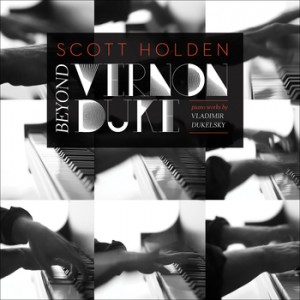 SCOTT HOLDEN, PIANO; “Beyond Vernon Duke” (Tantara Records) ****
SCOTT HOLDEN, PIANO; “Beyond Vernon Duke” (Tantara Records) ****
The state of the recording industry today unfortunately focuses its efforts on a rather limited number of works that are proven sellers, and too often it stymies artists looking outside the box for works to record. So it’s a breath of fresh air when a performer and a label come together to record music that without any doubt is largely unknown to most classical music aficionados.
Brigham Young University pianist Scott Holden and Tantara Records have released a fascinating disc of works by 20th century composer Vladimir Dukelsky, who is probably better known as Vernon Duke, the wildly popular composer of Broadway shows who wrote such classics as April in Paris and Taking a Chance on Love.
But like other 20th century composers who had a foot in both classical and popular worlds – Erich Wolfgang Korngold and Leonard Bernstein come readily to mind – Duke never gave up writing serious classical works while writing for Broadway.
For his album Beyond Vernon Duke, Holden has collected six works by Duke’s alter ego Dukelsky that span the composer’s entire creative period, from a piano reduction of selections from the early ballet score Zéphyr et Flore from 1925, to the Parisian Suite and the Sonata: Souvenir de Venise, both from 1955. Rounding out the album are the Three Caprices (1944); the Surrealist Suite (1939); and the brief Romance (1930).
Not only is Beyond Vernon Duke filled with material not widely known, it’s also an album of firsts: except for the sonata, the works are either world premiere recordings or premiere digital recordings. In short, this release is quite remarkable.
The album gives a wonderful glimpse into Duke’s other musical persona. His classical music is a vibrant and dynamic mélange of styles. His rhythms can be jazzy and complex or simple and straightforward. His piano writing is at times angular and stark, with a hint of Serge Prokofiev, and at times fluid and romantic. Occasionally he throws in a tune that could easily have come from one of his musicals. And there is frequently a jaunty, carefree attitude in his pieces that is reminiscent of Francis Poulenc, as well as snippets of biting wit a la Igor Stravinsky. There is a lot of variety in his music; it’s imaginative but also sometimes rather predictable. But it’s always interesting and keeps the listener’s attention because one never knows what to expect next. Duke’s style can best be described as kaleidoscopic.
This could prove problematic in terms of interpretation for a lesser pianist, but Holden does a fabulous job in capturing the character and mood of each piece. He brings an extraordinary cohesiveness to the music that isn’t easy to do, given its almost quixotic nature. The performances captured on this disc aren’t by someone with a casual, passing acquaintance with this music. Instead, it’s by a pianist who understands the music and the man behind it; listening to the album makes this abundantly obvious. Holden moves easily and naturally between the disparate idioms and makes these pieces his own. His technique is formidable, and as he wends his way through these pieces, he makes it sound easy. Holden also exhibits profound musicality in his readings. His interpretations are well thought out and perceptive, and his playing is lucid and quite eloquent. There is crispness and cleanly defined articulation in Holden’s playing that serves the music well. He also imbues his playing with a broad palette of expressions and invests his readings with emotion and feeling. These aren’t academic excursions; these are viable, compelling performances that bring depth to this music and make it come alive.
Technically, the album is on the same high level as the artistry. Ron Simpson co-produced the album with Holden. And while it was recorded in BYU’s Madsen Recital Hall and not in a recording studio, the recorded quality is stellar. The piano’s sound and timbral richness are well balanced and cleanly defined.
The liner notes by Simpson and Michael Hicks are well written and, given the necessarily limited space for text, are informative and enlightening and give insight into the Duke/Dukelsky dichotomy.
Kudos to everyone involved in this project. This is an album that scores extremely high in all categories and deserves its four star rating.
